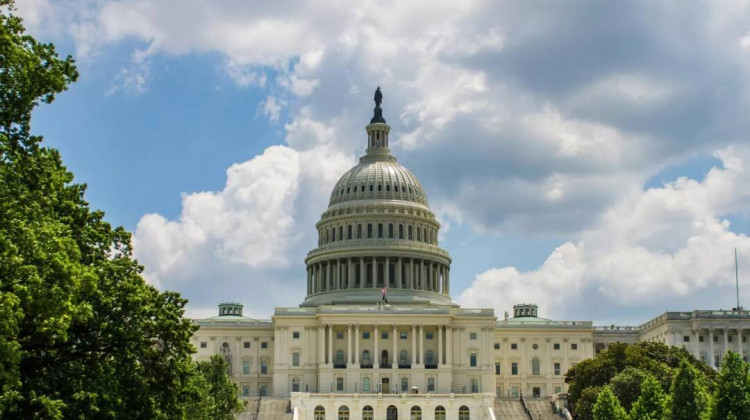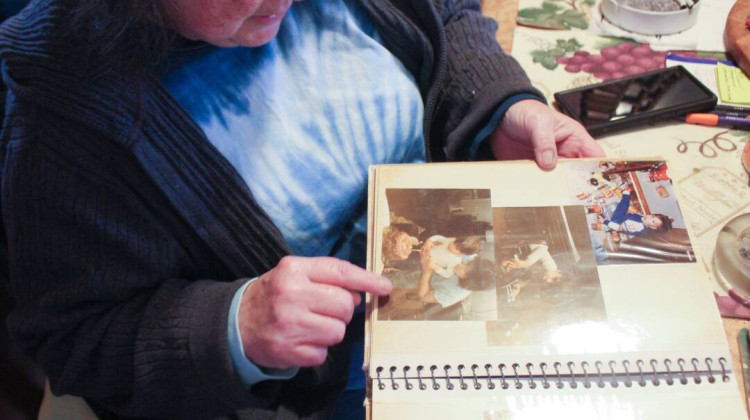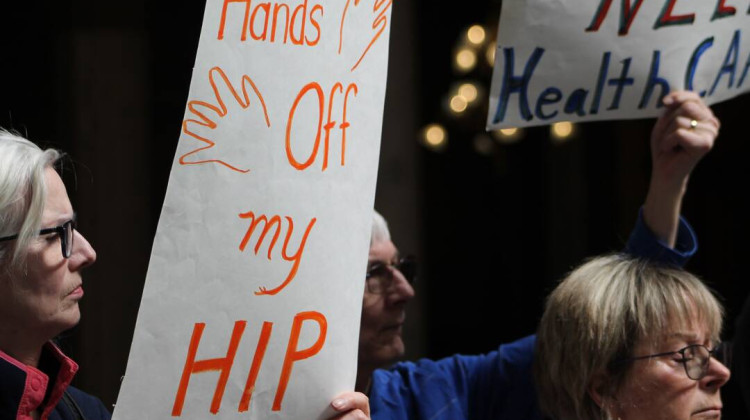
Business finally winds down at Infiniti Men’s Salon after all-day health screenings at the barbershop.
Samantha Horton/IPB NewsIt's a busy Saturday afternoon at the Infiniti Men's Salon just north of downtown Indianapolis. There are several chats happening in the shop, but amid the sounds of clippers and music, two volunteers sit at a table asking people if they want to participate in a free health screening.
Tracey Scott is a medical assistant and is checking blood pressure, blood sugar levels, and body mass index - some of the statistics that can indicate health issues affecting black men.
"In the black culture, African American culture, high blood pressure, diabetes, being overweight obviously that's very prominent," says Scott.
This is the eighth year of the Black Barbershop Health Initiative in Indiana, a statewide initiative working to increase awareness of health issues among African-Americans throughout the month as black men get a trim or a shave.
According to the U.S. Department of Health & Human Services, a 2009 report showed black men suffer disproportionately from diabetes and high blood pressure, among other health concerns.
Scott hopes by bringing the screenings into a comfortable social setting, it will convince more of the barbershop's customers to seek preventative care.
"You have a lot of people that walk in the door especially on a Saturday. So, it's better than being in a clinic because you're not going to get as many people not been screened that walk into a clinic," says Scott.
The other volunteer is Clayton Verhey, a junior at the University of Indianapolis majoring in public health. He got involved through one of his classes having him and fellow classmates complete a mini internship. Verhey says it's been an eye-opening experience.
"It's given me a chance to work with a different population that I've never really worked with," says Verhey. "It's something that I could look forward to doing again next year hopefully."
When deciding to hold the event in barbershops, Indiana Commission on the Social Status of Black Males executive director James Garrett says it's critical to get into the African-American population especially black males having the highest mortality rate in the state.
"Well we tried to find a place where black males would feel comfortable and you could perform the screenings," says Garrett. "We looked at churches, we looked at community services, where black men gathered. And we choose the barbershop because it's a comfortable environment, it allows them to get a professional service that they're coming in for already and get value added screenings."
Infiniti Men's Salon manager Richard Gladney has participated in the initiative for several years and is encouraging all his customers to get tested.
"The barbershop is like a cornerstone of our neighborhood and the black community," says Gladney. "And there's always a stigma with, especially black men, not going to the doctor so for some of this is the only check-up we get. So it's a place that a lot of black men come to and it all comes together and works out perfectly."
There are customers that turn down the offer, but eventually one approaches the table to get screened.
Cailente Mclin, 19, sits down and rests his left arm on the table to check his blood pressure. Scott put's the inflatable cuff around his bicep and starts the machine. When it beeps it reads 142 over 98. It's a little high, which doesn't surprise him.
"I did have a heart attack back in December, pretty much puts me on my toes to be aware of my health to make sure I'm in good standings because I've got other people depending on me like family members, my fiancé, my brothers and sisters," says Mclin.
Mclin's had uncles die in their 40s because their heart disease diagnosis was too late to be treated. He says he's glad he took advantage of the screening, but also wishes the program was more widespread.
"I actually think this is a good idea," says Mclin. "Should be in multiple places because never know that somebody wants to get their blood sugar checked or wants to know if they're in good health standings or just figure out overall if their actual weight is their actual weight."
After going through results with participants, medical volunteer Tracey Scott provides them with information about clinics nearby.
"Then we also have some literature also that we hand out showing people that there are free clinics in their areas that they can go to," says Scott. "And a lot of people just don't realize that; they don't know. And information, knowledge is power."
The six-hour outreach ends at 3 p.m. Looking at the final list of participants, about 20 people took part in the screening. That's a record turnout for this particular shop. Infiniti Men's Salon is not the only shop in Central Indiana to have a positive turnout, says Garrett.
"The turnout has been very good in Indianapolis," says Garrett. "We had barbers that couldn't even get screened at a couple of the shops because they were so busy."
Gladney wishes the event could happen more often.
"Once a year is definitely not enough because it's only on one day and we're open seven days a week so there's a lot of people that's not getting the experience," says Gladney. "So even if you continue to do it on a Saturday, which is good cause it's a busy day, it needs to be more Saturdays throughout the year so more people can experience it."
The Black Barbershop Health Initiative will be in Michigan City and South Bend on April 28.
 DONATE
DONATE









 Support WFYI. We can't do it without you.
Support WFYI. We can't do it without you.